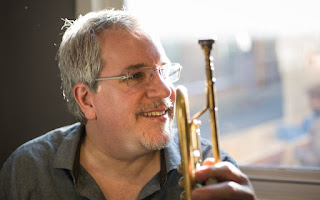John Bailey has supportive depth from rhythm section in 'Time Bandits"
 | |||
| John Bailey: Collaborative window in "Time Bandits" |
My previous acquaintance with trumpeter John Bailey on record came on the eve of the pandemic onslaught as he looked backward affectionately at his idol Dizzy Gillespie's whimsical run for president. "Can You Imagine?" was the title for a disc that asked the listener to suppose the honoree's uptilted trumpet might lift up a nation's spirit from the Oval Office.
"Time Bandits" is a more satisfactory CD, much as the charm of "Can You Imagine?" put across its intended point. What's significant about the new recording is the focus on a quartet enhancing Bailey's horn, grounded in the drums of Victor Lewis, a longtime Bailey collaborator, and the stellar support of bassist Scott Colley and pianist George Cables.
You don't have to wait for the last track, "Groove Samba," to be convinced of the fellow-feeling that animates the CD. That Bailey original exemplifies it best: Lewis drives it, but the pervasive swing is shared generously among the four. Ever attentive but not dominant, the drummer puts colorful variety behind his colleagues, right through a long coda.
It's also a treat to savor Cables in this setting. Rapport with the leader is more than sufficiently demonstrated by the duo performance of the pianist's composition "Lullaby," where shared tenderness is not just a laurel to rest on, but a generator of fine lyricism from both players.
Cables is ever inspired by melody, and also varies his style to suit the material. His solo in the Beatles' poignant "She's Leaving Home" has a bit of "church" about it. Bailey is double-tracked so that the answering countermelody in the original is represented. Lewis underlines the sadness of the daughter's enigmatic departure with pointillist hand-drumming. Cables neatly echoes Bailey's "bye-bye" at the very end.
Similarly, Cables' solo on "How Do You Know?" displays the same spirit as Bailey's nimble flugelhorn. Cables is at his most florid, without becoming overdecorative, in Bailey's "Ode to Thaddeus," a tribute to another historic trumpet master, Thad Jones. The ballad is an extended showcase for Bailey, displaying great tone on sustained notes and a rich vibrato.
A medium-bounce tempo suits a performance of Jerome Kern's "Long Ago and Far Away," with an effective bass solo crowning the series of solos just before the outchorus. Group collaboration is at its height in "Rose," a quirky twelve-tone piece, featuring a balanced trumpet-piano-bass unison line.
As curtain-raiser, the disc's title tune has an infectious stop-start energy in its main phrase, partnered with a bridge that eases back to the "A" section. Everything flows from there so naturally that the listener senses immediately that a lot of good music lies ahead over the ten tracks.



Comments
Post a Comment